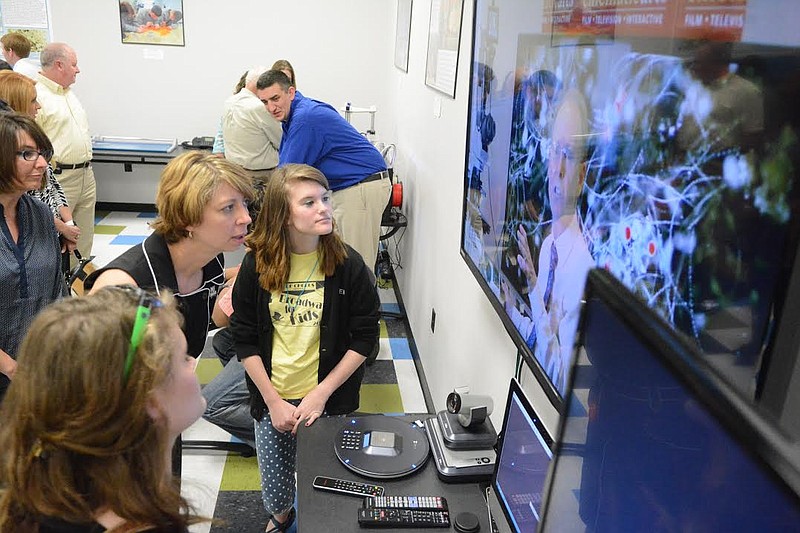US Ignite announced today that Chattanooga is among the first group of cities to be named Smart Gigabit Communities, a new effort to foster a national high-speed internet application development ecosystem.
US Ignite, which was awarded a $6 million National Science Foundation grant last fall "to build a living lab of test beds for smart gigabit applications" in Chattanooga and 14 other cities, announced the new initiative this morning at the Smart Cities Innovation Summit in Austin, Tex..
Each Smart Gigabit City has committed to develop at least two gigabit-enabled applications or public services and to share them with other cities involved in the program. On Wednesday, Chattanooga will demonstrate to the national conference its remote ultra HD (4K) microscopy at the STEM School Chattanooga, live 4K streaming from the Tennessee Aquarium, and a joint musical performance between Chattanooga Public Library and Austin using low latency conferencing technology and Internet2.
"Chattanooga was definitely the pioneer in this space, but there are more players and more opportunities every day for using gigabit speed," said Ken Hays, president of the Enterprise Center in Chattanooga. "Five or six years ago, people were asking what you would ever do with the Gig. Now people want to know when they can get it. The next generation of the internet is starting to take shape."
Chattanooga's municipal electricity provider, EPB, pioneered the first communitywide gigabit internet in the Western Hemisphere in 2010. But now Comcast, AT&T, Google and others are matching such high-speed links, at least for their business customers.
US Ignite is exploring ways to better connect those cities which have high-speed internet to avoid them from being islands separated by inadequate national connections. The 4K technology uses a dedicated connection between two points, rather than the public internet.
"Chattanooga continues to be on the national forefront in the development and deployment of new applications that will profoundly impact how Americans live, work and play," said Bill Wallace, executive director of US Ignite. "The city is a crucial part of our efforts to jump start a critical mass of gigabit applications addressing national priorities."
Hays likened the new gig connections to how electricity first developed with new applications for such power being developed and new lines and connections being needed to extend service everywhere.
In a statement today, Chattanooga Mayor Andy Berke said he is "proud to join a handful of cities to create a network of communities looking for real ways to impact everyday life for citizens.
"As a leader in the innovation economy, Chattanooga is demonstrating three of the gigabit applications featured during today's conference. That means our local talent, assets, and technological infrastructure will be a catalyst in how communities across the world access healthcare, teach students, keep streets safe, and use energy more efficiently."
On hand to demonstrate the power of gigabit connectivity for education are Dr. Richard Weinberg of USC School of Cinematic Arts, STEM School Chattanooga science instructor, Shannon Siegle, and 12th grade student, Katie Stiffler. Together, they will showcase how STEM School Chattanooga students are able to see and learn about microbiology in 4K because of Dr. Weinberg's 4K microscope and gigabit connectivity.
Nokia representatives will present the Chattanooga Airport's live 4K video stream from the Alligator Bayou habitat in the Tennessee Aquarium. A collaborative effort among Chattanooga and Nokia Connect partners, this project is the first municipal demonstration of ultra-high definition live video in the country.
Promoting the benefits of gigabit speeds in the arts will be musicians from Chattanooga and Austin performing together from hundreds of miles away from one another using Internet2 and a low latency audio visual streaming system. The low latency software, paired with high-speed connectivity allows musicians to collaborate despite their physical distance from one another.
Smart Cities Solutions includes more than 140 cities from around the globe working to use technology to build smarter power grids and internet services. This week's conference includes more than 2,000 city leaders and planners from across the country.
